Pingtan's marine delicacies blend tradition and innovation to win hearts beyond China
en.ptnet.cn | Updated:2025-09-23 | Lin Kongbo, StephaniePingtan, a coastal county in Fujian Province and the Chinese mainland's closest point to the island of Taiwan, stands as China's second international tourism island after Hainan. Renowned for its cross-Strait integration efforts and rich maritime culture, the island has recently gained attention for a different treasure: its marine delicacies. By blending time-honored craftsmanship with modern creativity, local producers are turning fish balls, dried seafood, and other coastal treats into "Pingtan business cards" that carry the island's flavor and heritage to markets across China and beyond.
"Song Jin Ji": Upholding Centuries-Old Craftsmanship
For years, "Lao Song Fish Balls" was a beloved local spot in Pingtan, known for its chewy, flavorful fish balls. Today, the brand has evolved into "Song Jin Ji," a standardized enterprise led by Song Mei, the third-generation heir who registered the trademark and founded a company in 2016 to scale up production while preserving tradition.
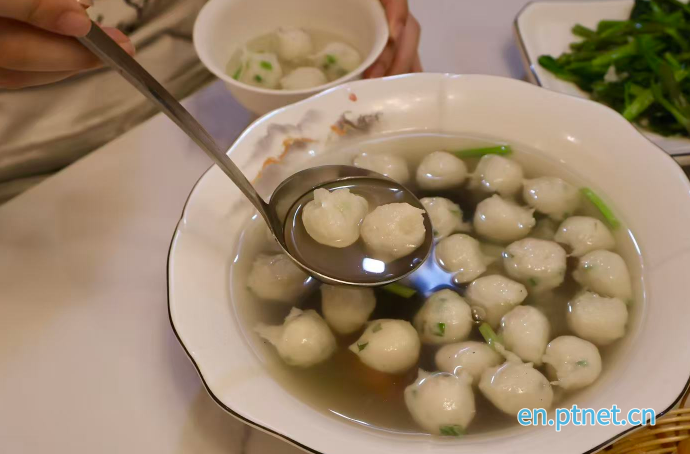
Mackerel fish ball soup
The secret to Song Jin Ji's success lies in its strict production process. Each day, workers start at dawn to process mackerel—cleaning, deboning, and slicing the fish before cooling it to a precise temperature of 0°C to -5°C. "This temperature rule is non-negotiable; it keeps the fish fresh and the texture right," Song explained. The fish is then turned into a paste, with some batches hand-beaten (a method favored by long-time customers for its richer flavor) and others machine-made for efficiency. A key ingredient is home-brewed Pingtan rice wine, not ordinary cooking wine. "Without the rice wine, the fish balls lose their soul," Song noted. A pinch of local sour bamboo shoots is added to the broth, giving it a light, refreshing tang similar to that of the popular Chinese luosifen (also known for its sour notes), but milder.
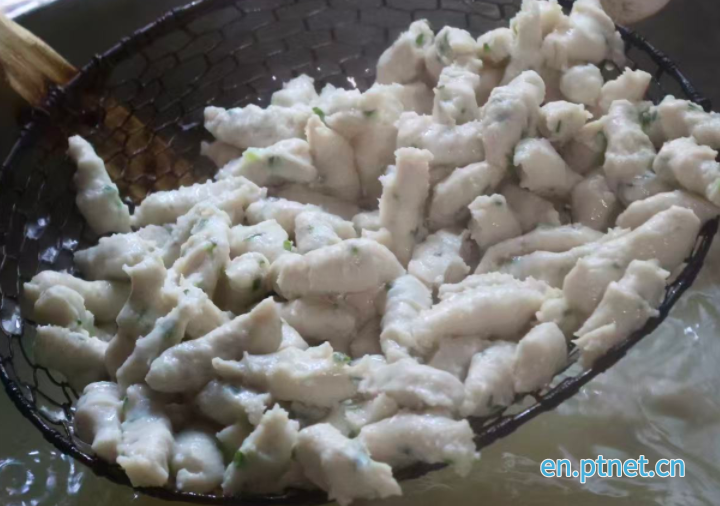
Strip-shaped mackerel fish Balls
From its original mackerel fish balls (available in round and strip shapes), Song Jin Ji has expanded to include eel paste, fish noodles, and fish dumplings. Locals often buy them vacuum-packed to send to relatives abroad. "It's the taste of home," one regular customer said.
"Mai Xian Xian": Modernizing Seafood Gifts
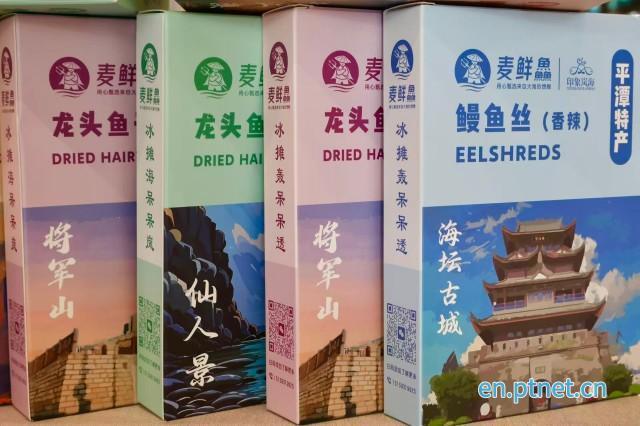
Seafood gift box printed with Pingtan scenery
Yu Ting, a 90s-born local, noticed a gap in Pingtan's seafood market: high-quality products like dried butterfly shellfish, dried cuttlefish, and top-grade laver were often sold in plain bags, lacking appeal as gifts. To change this, she launched "Mai Xian Xian," a brand that combines traditional seafood with modern design and technology.
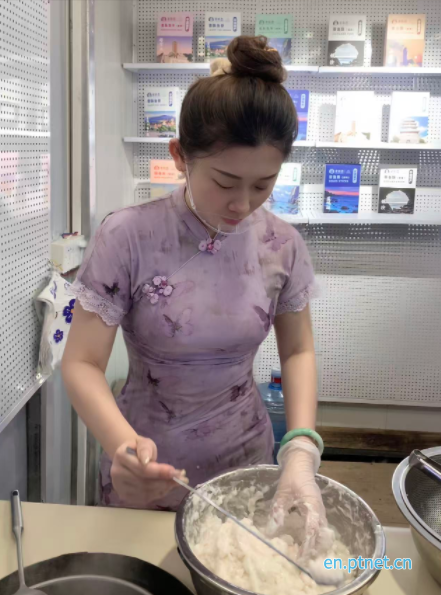
Yu Ting making fish balls
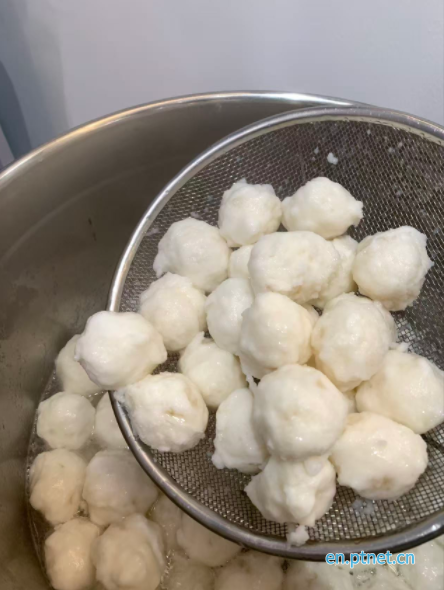
Handmade cuttlefish balls
Yu spent months visiting fishing villages to learn how to select the best seafood and studying traditional processing techniques from elderly fishermen. Her signature product, the cuttlefish ball gift box, uses fresh cuttlefish with no additives. "When you bite into it, it's tender, juicy, and full of cuttlefish flavor—exactly the taste of the sea," Yu said. The gift boxes themselves are works of art, decorated with hand-drawn images of Pingtan's famous "blue tears" (bioluminescent plankton) and Shipaiyang Rock Sails, showcasing the island's natural beauty.
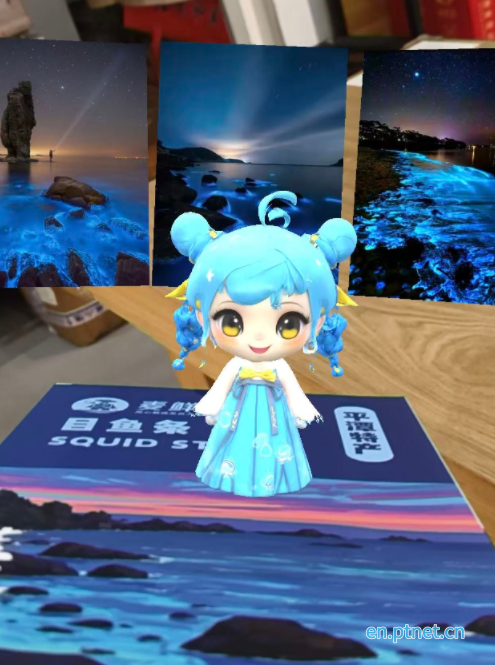
AR visuals unveiled by scanning the QR code
To add a tech-savvy touch, Yu integrated AR technology into her products. Scanning a QR code on the box with a WeChat mini-program lets customers view virtual tours of Pingtan's scenic spots. "I want people to not only taste Pingtan but also see its beauty," Yu said. She plans to add a traceability system soon, allowing customers to check the origin and processing of each product.
Thanks to its quality and unique design, Mai Xian Xian's products have been sold to places as far as Inner Mongolia and Xinjiang. "Our biggest strength is that customers know exactly what they're eating—and they trust it," Yu added.
A Taste of Daily Life in Pingtan
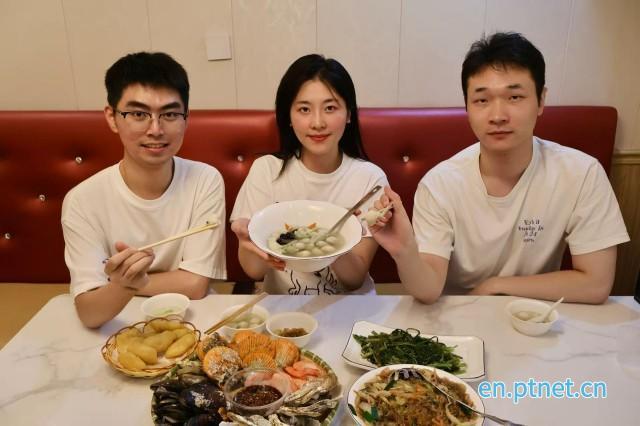
Li Xing (2nd from the left) and friends enjoying fish ball soup
For locals, these seafood delicacies are more than just food—they are woven into the fabric of daily life. Every evening, the streets of Pingtan come alive with the aroma of seafood restaurants. At a popular spot on Xihang Road, diners slurp fish ball soup topped with green onions and vinegar, while others enjoy oyster omelets with friends. "This soup warms me up after a long day," said Li Xing, a regular. "It's the taste I've had since I was a kid—chewy fish balls, fresh broth, and that hint of sourness."
At home, families often cook "yu pai" (fish steak): mackerel slices marinated, coated in sweet potato starch, and pounded repeatedly before steaming. The result is a golden, fragrant dish that's a staple at family meals. "Picking fresh seafood from the market and cooking it for my family gives our days a sense of hope," said a local housewife.
Whether it's the traditional fish balls from Song Jin Ji or the modern gift boxes from Mai Xian Xian, Pingtan's marine delicacies tell a story of an island that honors its past while embracing the future—one delicious bite at a time.

 Fujian Public Security Registration Code: 35012802000271
Fujian Public Security Registration Code: 35012802000271